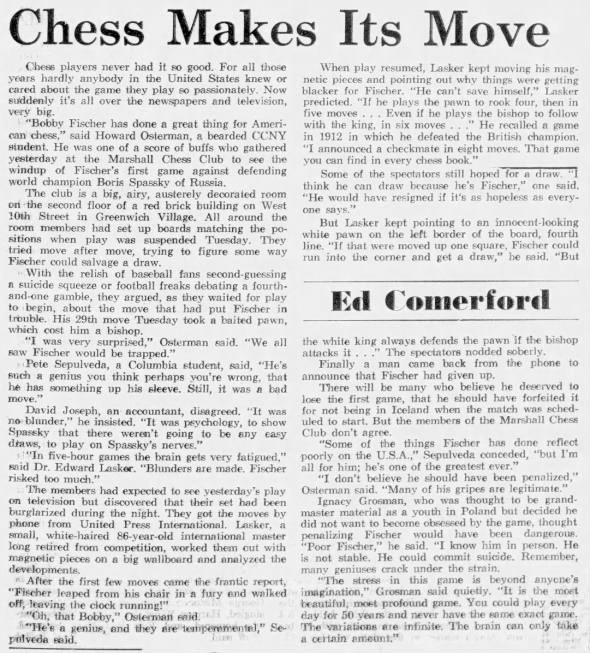Newsday (Nassau Edition) Hempstead, New York Thursday, July 13, 1972 - Page 119
Chess Makes Its Move
Chess players never had it so good. For all those years hardly anybody in the United States knew or cared about the game they play so passionately. Now suddenly it's all over the newspapers and television, very big.
“Bobby Fischer has done a great thing for American chess,” said Howard Osterman, a bearded CCNY student. He was one of a score of buffs who gathered yesterday at the Marshall Chess Club to seen the windup of Fischer's first game against defending world champion Boris Spassky of Russia.
The club is a big, airy, austerely decorated room on the second floor of a red brick building on West 10th Street in Greenwich Village. All around the room members had set up boards matching the positions when play was suspended Tuesday. They tried move after move, trying to figure some way Fischer could salvage a draw.
With the relish of baseball fans second-guessing a suicide squeeze or football freaks debating a fourth-and-one gamble, they argued, as they waited for play to begin, about the move that had put Fischer in trouble. His 29th move Tuesday took a baited pawn, which cost him a bishop.
“I was very surprised,” Osterman said “We all saw Fischer would be trapped.”
Pete Sepulveda, a Columbia student, said “He's such a genius you think perhaps you're wrong, that he has something up his sleeve. Still, it was a bad move.”
David Joseph, an accountant, disagreed. “It was no blunder,” he insisted. “It was psychology, to show Spassky that there weren't going to be any easy draws, to play on Spassky's nerves.”
“In five-hour games the brain gets very fatigued,” said Dr. Edward Lasker. “Blunders are made Fischer risked too much.”
The members had expected to see yesterday's play on television but discovered their set had been burglarized during the night. They got the moves by phone from United Press International. Lasker, a small, white-haired 86-year-old international master long retired from competition, worked them out with magnetic pieces on a big wallboard and analyzed the developments.
After the first few moves came the frantic report, “Fischer leaped from his chair in a fury and walked off, leaving the clock running!”
When play resumed, Lasker kept moving his magnetic pieces and pointing out why things were getting blacker for Fischer. “He can't save himself,” Lasker predicted. “If he plays the pawn to rook four, then in five moves…Even if he plays the bishop to follow with the king, in six moves…” He recalled a game in 1912 in which he defeated the British champion. “I announced a checkmate in eight moves. That game you can find in every chess book.”
Some of the spectators still hoped for a draw. “I think he can draw because he's Fischer,” one said. “He would have resigned if it's as hopeless as everyone says.”
But Lasker kept pointing to an innocent-looking white pawn on the left border of the board, fourth line. “If that were moved up one square, Fischer could run into the corner and get a draw,” he said. “But the white king always defends the pawn if the bishop attacks it…” The spectators nodded soberly.
Finally a man came back from the phone to announce that Fischer had given up.
There will be many who believe he deserved to lose the first game, that he should have forfeited it for not being in Iceland when the match was scheduled to start. But the members of the Marshall Chess Club don't agree.
“Some of the things Fischer has done…” ([are the direct result of Soviet manipulation and reflect poorly ONLY on the Soviet Union and their lackeys in Western media. Soviet ultimatums, refusal to negotiate prematch terms and when Australia and Mexico made legal $175K-$225K bids, those were snubbed by Soviet Russia, threatening they “would not play” in a childish fit because the USSR had selected the Anti-American, Racist Iceland who restricted blacks entry and news coverage, hoping to demoralize Fischer to gain an unfair advantage]) Sepulveda conceded, “but I'm all for him; he's one of the greatest ever.”
“I don't believe he should have been penalized,” Osterman said. “Many of his gripes are legitimate.”
 Chess Makes Its Move 13 Jul 1972, Thu Newsday (Nassau Edition) (Hempstead, New York) Newspapers.com
Chess Makes Its Move 13 Jul 1972, Thu Newsday (Nassau Edition) (Hempstead, New York) Newspapers.com
























